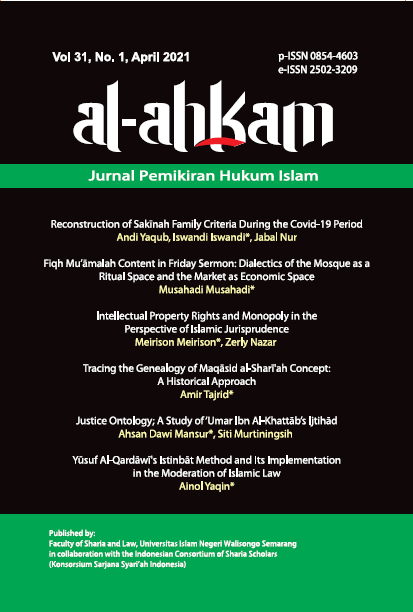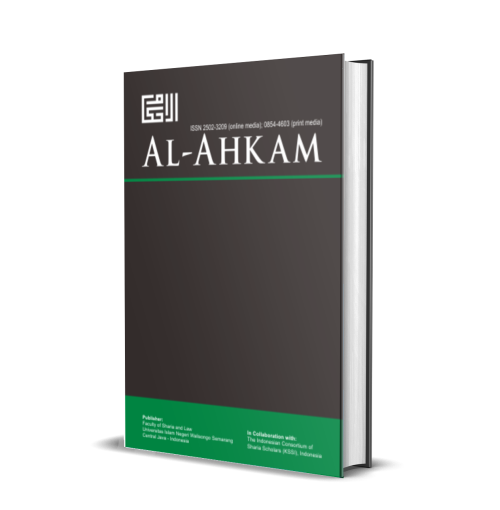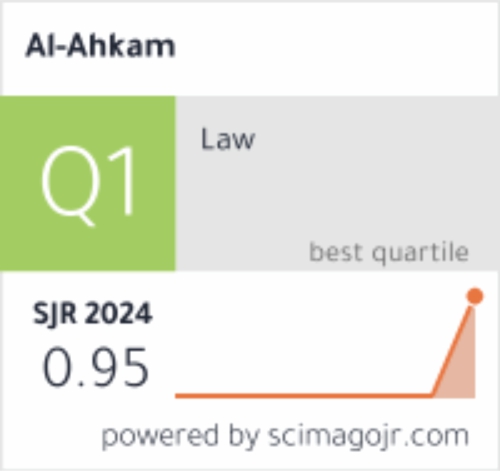Intellectual Property Rights and Monopoly in the Perspective of Islamic Jurisprudence
DOI:
https://doi.org/10.21580/ahkam.2021.31.1.6656Keywords:
IPR, Islamic Jurisprudence, Intellectual Wealth, MonopolyAbstract
This paper aims to reveal fiqh's review of Intellectual Property Rights (IPR) and their relationship with monopolies that can harm humankind. There are two opinions in contemporary fiqh regarding IPR; first, Ahmad al-Ḥujjī al-Kurdī, which states that IPR as part of worship, should not be hidden and should not be monopolized and exploited by anyone. Second, Muṣṭafā Zarqā, Muḥammad Fatḥī al-Duraynī, Muḥammad Sa'īd Ramaḍān al-Būṭī who agree with the protection of IPR. Through literature study and descriptive analysis approach, this paper concludes that if intellectual property rights cause harm to society and the state, especially in the exploitation of material rights, then it has created a monopoly that is detrimental and prohibited. Every country has different policies to protect IPR when it does not harm the community and the state.
Downloads
References
Alizar, Meirison, and Qasim Muhammadi. ‘Islamic Sharia and Non-Muslim Citizens in Kanunname During Sultan Abdul Hamid II of the Ottoman Empire’. Walisongo: Jurnal Penelitian Sosial Keagamaan 27, no. 1 (30 July 2019): 37–68. https://doi.org/10.21580/ws.27.1.3543.
Amanullah, Muhammad. ‘Author’s Copyright: An Islamic Perspective’. The Journal of World Intellectual Property 9, no. 3 (1 May 2006): 301–15. https://doi.org/10.1111/j.1422-2213.2006.00279.x.
Al-Bahūtī, Manṣūr bin Yūnus bin Idrīs. Kashf al-Qinā’ 'an Matn al-Iqnā’. Beirut: Dār al-Kutub al-’Ilmiyyah, 2009.
Al-Būṭī, Muḥammad Sa’īd Ramaḍān. Qaḍāyā Fiqhiyah Mu’āṣirah. Dār al-Fārābī, 2001.
Dār Al-Iftā’ al-Miṣriyah. Ḥukm al-Iḥtikār. Kairo: Dār al-Iftā’, n.d.
Delforge, Isabelle. Dusta Industri Pangan: Penelusuran Jejak Monsanto Penulis. Yogyakarta: Insist, 2003.
Al-Duraynī, Fatḥī. Ḥaq al-Ibtikār fī al-Fiqh al-Islāmī al-Muqāran. Beirut: Dār al-Furqān, 2019.
Al-Falimbānī, Muḥammad Mukhtāruddīn. Bulūgh al-Amānī. Beirut: Dār al-Dutaybah, 1988.
Fahmi Fikri, Dimas, and Afif Noor. ‘Reformasi Hukum Wakaf di Indonesia Studi Terhadap Wakaf Hak Atas Kekayaan Intelektual’. Al-Ahkam 22, no. 1 (11 April 2012): 43–60. https://doi.org/10.21580/AHKAM.2012.22.1.3.
Fahmi, Reza. ‘Pengaruh Pembelajaran Kewirausahaan terhadap Motivasi Berwirausaha’. Share: Jurnal Ekonomi dan Keuangan Islam 1, no. 2 (31 December 2012): 99–117. https://doi.org/10.22373/share.v1i2.720.
Gautama, S. ‘Indonesia dan Konvensi-Konvensi tentang Hak Cipta’. Jurnal Hukum & Pembangunan 5, no. 3 (29 June 1975). https://doi.org/10.21143/jhp.vol5.no3.597.
Al-Ghamidī, Nāṣir bin Muḥammad. ‘Ḥimāyah al-Milkiyah al-Fikriyah fī al-Fiqh al-Islāmī wa al-Āthār al-Iqtiṣādiyah al-Mutarattibah ‘alayhā’, n.d. https://almoslim.net/node/275713.
Hanī, Abū Kurkhī Haysham. Tanẓīm al-Munāfasah wa Man’ al-Iḥtikār Ḍimn Ittifāqiyāt Munāẓamah al-Tijārah. Amman: The University of Jordan, 2015.
Ḥasan, Aḥmad. Al-Ibtikār fī al-Fiqh al-Islāmī. Kairo: Dār al-Nahḍah al-‘Arabiyah, 2016.
Hawting, G. R. ‘Taxation in Islam. Vol. III: Abū Yūsuf’s Kitāb Al-Kharāj. Translated and Provided with an Introduction and Notes by A. Ben Shemesh. Pp. Viii, 155. London, Luzac & Co., 1969. £4.25.’ Journal of the Royal Asiatic Society of Great Britain & Ireland 103, no. 2 (15 April 1971): 190–190. https://doi.org/10.1017/S0035869X00129296.
Al-Hindī, Nūr ’Īsā. ‘Intiqāl Ḥuqūq al-Milkiyah al-Fikriyah ilā al-Warathah fī Ḍaw’ al-Ma’āhadāt al-Dawliyah’. Majallah Jāmi’ah al-Shārifah li al-’Ulūm al-Shar’iyah wa al-Qānūniyah 10, no. 1 (June 2013): 279–302. https://doi.org/10.12816/0007426.
Husin, Umar Amin. Kultur Islam, Sedjarah Perkembangan Kebudajaan Islam dan Pengaruhnja dalam Dunia Internasional. Jakarta: Bulan Bintang, 1964.
Juwaynī, Aḥmad. Bayn al-Iḥtikār wa al-Ibtikār wa al-Irhāb al-Iqtiṣād. Mesir: Maṭba’ah Shabāb, 2017.
Al-Karīm, ‘Abd al-Karīm Ṣāliḥ ‘Abd. ‘Al-Iṭār al-Qānūnī li Tadābir al-Ḥimāyah al-Tiknūlūjiyah li al-Muṣannafāt al-Raqmiyyah Dirāsah Taḥlīliyah Muqāranah’. Journal of Legal and Political Studies 3, no. 1 (1 April 2015): 168–201. https://doi.org/10.17656/jlps.10062.
Khaldūn, Ibn. Tārīkh Ibn Khaldūn al-Musammā Kitāb al-ʿIbar wa Dīwān al-Mubtadaʾ wa al-Khabar fī Ayyām al-ʿArab wa al-ʿAjam wa al-Barbar wa Man ʿĀṣarahum Min Dhawī al-Sulṭān al-Akbar. Beirut: Dār al-Kutub al-’Ilmiyyah, 1992.
Khalīl, Usāmah Muḥammad ‘Uthmān. ‘Al-Milkiyah al-Fikriyah fī Fiqh al-Islāmī’, n.d. https://www.cia.gov/library/abbottabad-compound/E5/E58E23A0EE71CFD694BEA8D5DF851B0DƒΘΩΘΦ∩í ƒΘσΦ⌐∩í σ∩ ƒΘστ∞ ƒΘ¥½ΘƒΩ∩.pdf.
Khan, Javaid Iqbal, and Ahmad Lone Naveed. ‘Intellectual Property Rights in Islam: A Perspective’. International Journal of Research in Social Science 3, no. 1 (February 2013). http://www.ijmra.us153.
Al-Kurdī, Aḥmad Ḥajjī. ‘Ḥukm Islām fī Ḥuqūq al-Ta’līf wa al-Nashr wa al-Tarjamah’. Hudā Al-Islām, 1981.
Lāshin, Mūsā Shāhin. Fatḥ Al-Mun’im Sharḥ Ṣaḥīḥ Muslim. Kairo: Dār al-Shurūq, 2002.
Madeley, John. Hungry for Trade: How the Poor Pay for Free Trade. London: Zed Books, 2000.
Maḥmūd, ’Uthmān Ibrāhīm ’Abd al-Mun’im. ‘Aḥkām Fiqhiyyah al-Muṭṭaliqāt bi al-Mihnah Ṣaydaliyyah wa Sina’ah al-Dawā’: Dirāsah Fiqhiyah Taṭbīqiyyah’. Mansoura Egypt, 2019.
Mangulu, Nikita Cinthya. ‘Hak Pemegang Paten Memberikan Lisensi Menurut Undang-Undang Nomor 13 Tahun 2016 tentang Paten’. Lex Privatum 6, no. 8 (4 February 2018). https://ejournal.unsrat.ac.id/index.php/lexprivatum/article/view/22875.
Meirison, Meirison. ‘Administration and Finance System of the Ottoman Empire’. Jurnal Ilmiah Al-Syir’ah 18, no. 2 (27 December 2020). https://doi.org/10.30984/jis.v18i2.1113.
Meirison, Meirison, Desmadi Saharuddin, and Rosdialena Rosdialena. ‘Takhrij Fikih dan Permasalahan Kontemporer’. Al-Istinbath: Jurnal Hukum Islam 5, no. 1 (9 May 2020). https://doi.org/10.29240/jhi.v5i1.1235.
Mulḥim, Mulḥim bin Ḥammad. ‘Al-Milkiyah al-Fikriyah bayn al-Iḥtikār wa al-Ibtikār wa Qawānīn al-Munāsifah’, n.d. https://www.aleqt.com/2017/09/13/article_1251176.html.
Muslim bin Al-Ḥajjāj. Ṣaḥīḥ Muslim. I. Libanon: Dār al-Fikr, 1992.
Al-Qarafī, Shihāb al-Dīn. Anwār al-Burūq fī Anwa’ al-Furūq. Kairo: Dār al-Ḥadīth, 2018.
Rosyid, Maskur. Implementasi Konsep Maslahat Al-Ṭūfī dalam Fatwa MUI (2005-2010). 1st ed. Magelang: Ngudi Ilmu, 2013.
Rosyid, Maskur, and Anwar Hafidzi. ‘Paradigma dan Alienasi Konsep Maslahat Al-Tufi Sebagai Legalitas Sumber Syariah’. Al-Banjari : Jurnal Ilmiah Ilmu-Ilmu Keislaman 19, no. 2 (15 December 2020). https://doi.org/10.18592/al-banjari.v19i2.3823.
Al-Salām, ’Izz ’Abd al-’Azīn bin ’Abd. Bidāyah al-Sūl fī Tafḍīl al-Rasūl. Lebanon: Dār al-Firk al-Mu’āṣir, 1999.
Al-Shahrānī, Ḥusayn ibn Maʻlawī. Ḥuqūq al-Ikhtirāʻ wa al-Taʼlīf fī al-Fiqh al-Islāmī. Riyad: Dār Ṭaybah li al-Nashr wa-al-Tawzīʻ, 2004.
Syufa’at, Syufa’at. ‘Implementasi Maqāṣid al-Sharī’ah dalam Hukum Ekonomi Islam’. Al-Ahkam 23, no. 2 (21 October 2013): 143. https://doi.org/10.21580/ahkam.2013.23.2.20.
Yaʻqūb, Abū Yūsuf. Taxation in Islam. Edited by Shemesh. Aharon Ben. Vol. 3. London: E. J. Brill, 1969.
Al-Zarqā, Muṣṭafā Aḥmad. Al-Madkhal ilā Naẓariyāt al-Iltizām al-‘Āmmah fī al-Fiqh al-Islāmī. Damaskus: Dār al-Qalam, 1999.
Downloads
Published
How to Cite
Issue
Section
License
By submitting an article to the journal, the author(s) agree to transfer the published article's copyright to the journal, which will act as the publisher. This means the journal will have the right to publish the article in various forms, including reprints. The journal will maintain the publishing rights to the published articles.
In line with the license, authors and third parties (readers, researchers, and others) are allowed to share and adapt the material. In addition, the material must be given appropriate credit, provided with a link to the license, and indicated if changes were made. If authors remix, transform or build upon the material, authors must distribute their contributions under the same license as the original.




